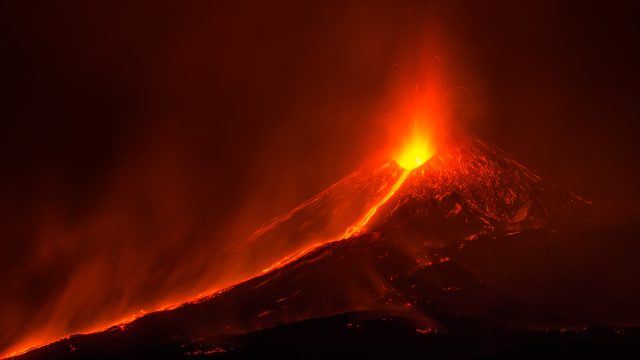Sicily winemakers brace as Mount Etna erupts
By Sarah NeishThe island’s volcano erupted yesterday after seeing “intense activity” over the last few days. db speaks to a leading Etna producer about what this signifies for the region’s wine industry.

Mount Etna erupted in the early hours of Tuesday 23 July, sending an 8km-high ash cloud into the sky.
“Following strombolian explosions yesterday evening [22 July], which became stronger, near-continuous and more intense, the activity increased into the violent lava-fountaining phase early night at 01:00 local time,” a report by Volcano Discovery said.
A statement released by authorities announced that Catania airport in the east of the island had closed its doors.
The “suspension of all incoming and outgoing flights” was confirmed, with take-offs and landings halted until the ash fall-out was over. Those passengers already on flights to Catania at the time of the eruption were diverted, largely to Palermo. However, some flights to Catania were able to resume by 10pm, despite hot ash drifting onto runways.
Catania airport was previously forced to shut due to an eruption just a few weeks ago on 5 July.
Local residents yesterday reported hearing “loud roars” from Etna, and feeling their windows shaking. And according to The National Institute of Geophysics and Volcanology, which monitors Etna closely, the highly visible ash cloud reached an altitude of 8km.
Mount Etna is one of Europe’s most active volcanoes, with its last significant summit eruption taking place in 2021 when so much volcanic material was emitted over a sixth-month period that Etna grew in height by almost 30 metres. However, lava has not reached towns since the 1800s.
The most violent historical Etna eruption was in 1669, when around 990 million cubic yards (830 million cubic metres) of lava were thrown out.
Etna wines
The news is clearly relevant for winemakers in Etna DOC, which have their vineyards planted on the volcano’s slopes. Home to around 166 producers including Tenuta Delle Terre Nere, Planeta and Frank Cornelissen, the incredibly fertile soils of Etna give rise to wines with a distinctive minerality and high acidity.
Speaking exclusively to the drinks business, Alessio Planeta, president of Etna producer Planeta says: “In recent years there have been no lava flows invading the wine-growing areas, and the volcanic ash does not represent a real problem for the vineyards.”
In fact, he says, the ash is “a valuable resource because it helps to form the volcanic sands that enrich the soil.”
Partner Content
The reason that the lava is unlikely to reach Etna vines is because “the conformation of the volcano allows lava to flow and deposit in large valleys between the main craters and the winegrowing area,” Planeta tells db.
Regarding yesterday’s eruption, he says, while it was “certainly an exciting spectacle, I would say that so far it is under control.”
He describes it as “a dustier one, but not so different [than usual]. Etna has been super active for a couple of years”.
Planeta also notes that evidence of the wine region’s longevity alongside Mount Etna can be seen in the ancient villages that have remained unscathed by its activity.
“Near our cellars there are two medieval villages, Randazzo and Castiglione, which are a sign of a long co-existence with the volcano,” he says.
“Sicily is super safe, and we are relaxed.”
Last year was a challenging one for Etna winemakers with the 2023 harvest down 25%. However quality was “excellent”, Maurizio Lunetta, director of Etna DOC, told the drinks business.
Organic viticulture is widely practiced in the region with around 60% of its 1,300ha farmed in this way.
Related reading:
Planeta pioneers first ever Sicilian wine bottle
Sicilia En Primeur 2024: brightness and resilience
The bridge that could change Sicily’s wine industry
Related news
Will white wine be central to Burgundy's future success in Asia?




